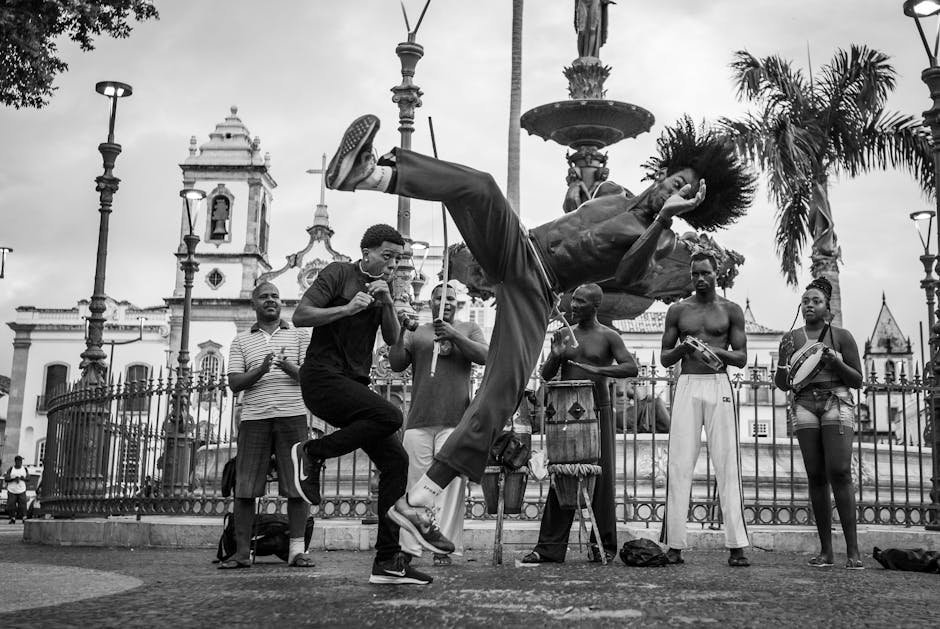“`html
Introduction to Rio de Janeiro’s Hospitality
Rio de Janeiro, often referred to as the “Marvelous City,” is celebrated not only for its stunning landscapes and vibrant festivals but also for its exceptional hospitality. The warmth and friendliness of its residents, known as ‘Cariocas,’ contribute significantly to the city’s allure. Cariocas are renowned for their welcoming nature, often going out of their way to ensure visitors feel at home, making Rio a top destination for travelers seeking genuine human connections.
Hospitality is deeply embedded in Brazilian culture, and in Rio de Janeiro, it is more than just a tradition; it is a way of life. The concept of ‘hospitalidade’ in Brazil is not merely about providing comfort but about creating an inclusive environment where everyone, regardless of their background, feels valued and respected. This cultural trait enhances the travel experience, allowing tourists to immerse themselves in the local way of life, fostering a sense of belonging and mutual respect.
The importance of hospitality in Rio de Janeiro is evident in various aspects of daily life, from the friendly greetings exchanged on the streets to the personalized service offered in hotels and restaurants. Cariocas take pride in their city and are eager to share its beauty and culture with visitors. This openness and eagerness to connect make Rio de Janeiro not just a place to visit but a place to experience.
Tourists often find that the genuine warmth of the Cariocas is one of the most memorable aspects of their visit. Whether it’s receiving helpful directions from a local or being invited to join a traditional samba dance, the hospitality of Rio de Janeiro leaves a lasting impression. This cultural richness and welcoming spirit are what make Rio de Janeiro a unique and unforgettable destination.
The Carioca Spirit: Understanding Local Warmth
Rio de Janeiro, often referred to as the “Marvelous City,” is not only known for its stunning landscapes and vibrant festivals but also for its warm and welcoming inhabitants, the Cariocas. Understanding the Carioca spirit requires delving into the cultural values that shape their unique approach to life, characterized by joy, friendliness, and a strong sense of community.
At the heart of the Carioca spirit lies an unwavering commitment to joy. This is evident in the way residents embrace life with an open heart and a ready smile. Cariocas are known for their infectious enthusiasm, whether they are participating in the world-famous Carnival or simply enjoying a sunny day at Copacabana Beach. Their zest for life is palpable, creating an inviting atmosphere that leaves a lasting impression on visitors.
Friendliness is another cornerstone of Carioca culture. Visitors often recount how they were treated like family by locals. One tourist from Canada shared, “I was amazed by how strangers would strike up conversations with me and offer help without hesitation. It felt like everyone was genuinely interested in making my stay memorable.” This openness and willingness to connect with others are what make Rio de Janeiro such a welcoming destination.
Community plays a pivotal role in fostering this environment of warmth. Cariocas place great importance on social gatherings, where music and dance are integral components. Samba, bossa nova, and forró are more than just musical genres; they are expressions of the Carioca way of life. Street parties, known as “blocos,” and spontaneous dance sessions in public squares are common, bringing people together and creating a sense of belonging.
The Carioca spirit is a testament to the power of cultural values in shaping a welcoming environment. Through their dedication to joy, friendliness, and community, the people of Rio de Janeiro extend a warm welcome to all who visit, leaving an indelible mark on their hearts.
Cultural Richness: A Melting Pot of Traditions
Rio de Janeiro stands as a testament to the harmonious confluence of diverse cultural influences, shaping its unique and vibrant identity. The city’s cultural richness is deeply rooted in a blend of African, Portuguese, and Indigenous traditions, each contributing to the lively and inclusive atmosphere that Rio is renowned for.
The African influence in Rio de Janeiro is palpable, particularly in the realm of music and dance. Samba, a genre born from African rhythms, has become a symbol of Brazilian culture. Originating in the early 20th century, samba has evolved into various forms, with the lively beats and engaging dance steps captivating both locals and tourists. The annual Carnival, a grand celebration marked by elaborate parades, showcases the vibrant spirit of samba, making it an integral part of Rio’s cultural fabric.
The Portuguese legacy, stemming from the colonial era, is evident in Rio’s architecture, language, and religious practices. Iconic landmarks such as the São Bento Monastery and the quaint cobblestone streets of Santa Teresa reflect the city’s colonial past. The Portuguese language, spoken by the majority of the population, serves as a unifying thread, while traditional festivals, like Festa Junina, celebrate the country’s agricultural heritage and deepen the cultural connection to Portugal.
Indigenous cultures, though often overshadowed, have left an indelible mark on Rio de Janeiro. Indigenous art, cuisine, and traditions continue to influence modern-day practices. Local dishes such as moqueca and vatapá, rich in flavors and history, are a testament to the culinary contributions of Indigenous peoples. Additionally, various crafts and rituals, preserved and celebrated in cultural events, highlight the enduring significance of Indigenous heritage.
This rich cultural tapestry, woven from myriad traditions, creates a dynamic and inclusive environment. Rio de Janeiro’s cultural diversity not only enhances its appeal as a tourist destination but also fosters a sense of unity and pride among its residents. The city’s ability to embrace and celebrate its multifaceted heritage is a key factor in its warm and welcoming atmosphere, inviting visitors to immerse themselves in a truly unique cultural experience.
Iconic Tourist Attractions: Must-Visit Spots
Rio de Janeiro is synonymous with iconic landmarks that captivate visitors from around the globe. Among its most celebrated attractions is the towering Christ the Redeemer statue. Perched atop Corcovado Mountain, this colossal statue offers panoramic views of the city and the bay, making it an essential stop for any traveler. The welcoming nature of the locals often enhances the experience, as they readily share the rich history and cultural significance of this monument.
Another must-visit spot is Sugarloaf Mountain. Accessible via a thrilling cable car ride, this granite peak provides breathtaking vistas of Rio’s coastline, especially enchanting at sunset. The journey to the top is as memorable as the destination itself, with the friendly locals eager to offer tips on the best viewing spots and photo opportunities.
Copacabana Beach is undoubtedly one of the world’s most famous beaches, renowned for its vibrant atmosphere and stunning shoreline. Whether you’re soaking up the sun, playing a game of beach volleyball, or simply enjoying the lively promenade, the warmth and hospitality of the Cariocas (Rio’s residents) create an inviting environment that makes every visit special.
The Maracanã Stadium stands as a testament to Brazil’s deep-rooted passion for football. Hosting numerous historic matches, including World Cup finals, this stadium is a pilgrimage site for sports enthusiasts. Guided tours often include anecdotes from local guides, who passionately recount the stadium’s storied past and its significance in Brazilian culture.
In Rio de Janeiro, each iconic attraction is not just a visual marvel but a shared experience enriched by the locals’ innate friendliness. Their enthusiasm and pride in their heritage undoubtedly enhance every visit, making these landmarks not just places to see, but memories to cherish.
Hidden Gems: Off-the-Beaten-Path Experiences
Beyond the renowned beaches of Copacabana and the iconic Christ the Redeemer statue, Rio de Janeiro offers a plethora of lesser-known treasures that provide a richer, more authentic experience of the city. To truly immerse oneself in the vibrant Carioca culture, it is essential to explore beyond the typical tourist attractions and venture into the heart of the city’s neighborhoods.
One of the best ways to experience Rio’s local flavor is by visiting its bustling markets. The Feira de São Cristóvão, an expansive market dedicated to Northeastern Brazilian culture, offers everything from traditional foods and handmade crafts to live forró music. Another noteworthy market is the Feira Hippie de Ipanema, held every Sunday, where visitors can find unique artisanal goods and interact with local artists and craftsmen.
Neighborhood bars, known as botecos, are another integral part of Rio’s social fabric. These casual establishments offer a relaxed atmosphere where locals gather to savor petiscos (snacks) and sip on cold chopp (draft beer). Some standout botecos include Bar do Mineiro in the bohemian neighborhood of Santa Teresa, known for its feijoada and caipirinhas, and Boteco Belmonte in Flamengo, famous for its empadas and lively ambiance.
Cultural centers provide additional opportunities to delve into Rio’s rich heritage. The Parque Lage, a public park featuring an art school and café housed in a historic mansion, offers both natural beauty and cultural enrichment. The Centro Cultural Banco do Brasil (CCBB) is another excellent venue, hosting a variety of exhibitions, theater performances, and film screenings, all housed within a neoclassical building.
For those looking to connect with locals and experience the authentic Carioca lifestyle, venturing into these hidden gems is indispensable. Engaging with the community in local markets, botecos, and cultural centers allows visitors to appreciate the warmth and hospitality that define Rio de Janeiro, making their stay truly memorable.
Festivals and Events: Celebrating Together
Rio de Janeiro, a city known for its vibrant culture and lively spirit, hosts numerous festivals and events throughout the year that draw both locals and tourists alike. These celebrations are not merely tourist attractions; they are deeply rooted in the city’s cultural fabric, offering unique opportunities for communal joy and unity.
The most iconic event in Rio is undoubtedly the Carnival, a world-renowned spectacle that transforms the city into a pulsating sea of music, dance, and color. Held annually in February or March, the Carnival features elaborate parades with samba schools showcasing their talent in the Sambadrome. Street parties, known as “blocos,” take place all over the city, allowing everyone to immerse themselves in the festive atmosphere. The Carnival is more than a cultural phenomenon; it is a testament to the city’s spirit of togetherness and celebration.
Another major event is the New Year’s Eve celebration, known locally as “Réveillon.” Each year, millions gather on Copacabana Beach to bid farewell to the old year and welcome the new one. The event is marked by spectacular fireworks that light up the night sky, accompanied by live music and dance performances. The communal nature of this celebration is evident as people from all walks of life come together to share in the joyous occasion, symbolizing hope and renewal.
The Rio International Film Festival is yet another significant event that showcases the city’s cultural prowess. Held annually, this festival attracts filmmakers and cinema enthusiasts from around the globe. It features a diverse range of films, from mainstream blockbusters to independent productions, providing a platform for creative expression and cultural exchange. The festival not only highlights Rio’s cinematic contributions but also fosters a sense of global community through the universal language of film.
These festivals and events are integral to the cultural identity of Rio de Janeiro. They offer unparalleled experiences that bring people together, celebrating the city’s rich heritage and dynamic spirit. Whether you are a visitor or a local, participating in these events is a way to connect with the heart and soul of Rio.
Practical Tips for Tourists: Navigating with Ease
Visiting Rio de Janeiro can be an enriching experience, but it is essential to be well-prepared to navigate the city effectively. Start by learning a few basic Portuguese phrases such as “Olá” (Hello), “Por favor” (Please), and “Obrigado/Obrigada” (Thank you). These simple words can go a long way in making a positive impression on locals and enhancing your interactions.
Understanding cultural norms is equally important. Brazilians are known for their warm and friendly demeanor, so don’t be surprised if a local greets you with a hug or a kiss on the cheek. Embrace these customs with an open heart to fully experience the welcoming spirit of Rio. Additionally, when dining out, it is customary to leave a 10% tip, though some establishments may include it in the bill automatically.
Safety is a crucial consideration while exploring Rio de Janeiro. Stick to well-populated areas and avoid wandering alone after dark, especially in unfamiliar neighborhoods. Use reliable transportation options such as registered taxis or ride-sharing services. Keep your belongings secure and be mindful of your surroundings to prevent theft or pickpocketing.
When interacting with locals, be respectful and open-minded. Brazilians take great pride in their culture, so showing genuine interest and appreciation can foster meaningful connections. Always ask for permission before taking photographs of people, and be considerate of local traditions and practices.
By following these practical tips, you can navigate Rio de Janeiro with ease and make the most of your visit. Engaging with the local culture respectfully and staying vigilant will ensure a memorable and enjoyable experience in this vibrant city.
Conclusion: Embracing the Carioca Way of Life
In conclusion, Rio de Janeiro stands as a vibrant testament to a rich cultural tapestry intertwined with the warmth and hospitality of its residents. The city’s unique blend of historical landmarks, such as the Christ the Redeemer statue and Sugarloaf Mountain, alongside its lively neighborhoods, like Lapa and Santa Teresa, offers a diverse array of experiences that cater to every type of traveler.
One of the most remarkable aspects of Rio is its people, the Cariocas. Their inherent friendliness and open-hearted nature significantly enhance the allure of this bustling metropolis. Whether you’re enjoying the stunning beaches of Copacabana and Ipanema or participating in the electrifying festivities of Carnival, the welcoming spirit of the Cariocas enriches every encounter.
Moreover, Rio’s culture is deeply rooted in music, dance, and gastronomy, providing an immersive experience that leaves a lasting impression. Samba rhythms, bossa nova melodies, and the irresistible flavors of Brazilian cuisine invite visitors to fully engage with the local way of life. Exploring Rio de Janeiro is not just about seeing the sights; it’s about feeling the pulse of the city and connecting with its soul.
As you consider your next travel destination, let the charm of Rio de Janeiro beckon you. The city’s unparalleled beauty, combined with the genuine warmth of its inhabitants, promises an unforgettable journey. Embrace the Carioca way of life, and discover why so many visitors leave with fond memories and a desire to return. Rio de Janeiro’s welcoming embrace is not just a destination, but an experience that resonates long after you’ve left its shores.





